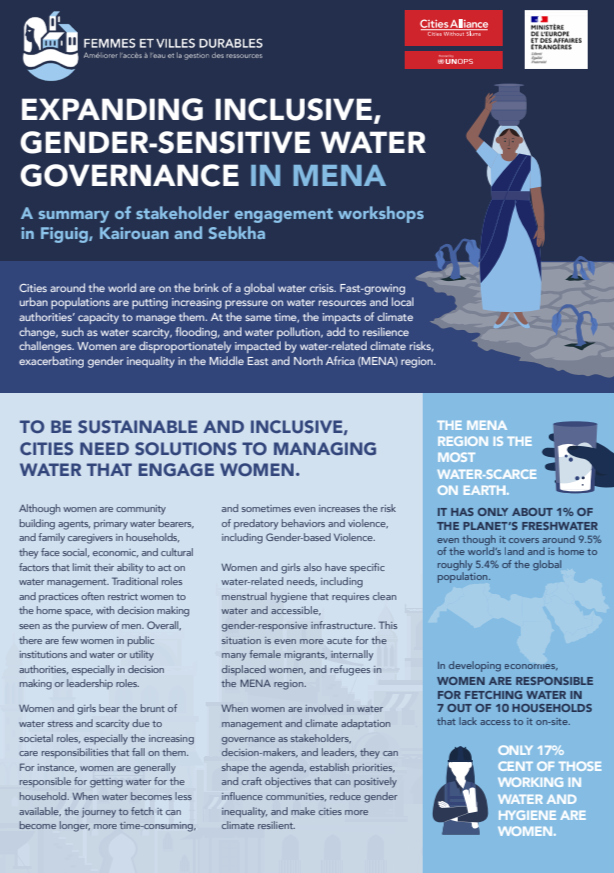The Women and Sustainable Cities programme (Femmes et Villes Durables in French) aims to strengthen women's leadership in the decision-making and management of scarce urban water resources in the MENA region. Launched in May 2023, the 2.5-year pilot will be implemented in collaboration with local governments and feminist organizations in Figuig (Morocco), Kairouan (Tunisia), and Sebkha (Mauritania).
By enhancing the capacities of local authorities and civil society, the programme promotes gender-responsive design and implementation of urban water management policies and projects. Collaborating with women and local organisations, the programme implements pilot projects in urban areas to improve women's access to water and enhance sustainable water management.
The programme is funded by the French Ministry for Europe and Foreign Affairs (MEAE), under its Solidarity Fund for Innovative Projects (FSPI). It has also been designated as a Support Fund for Feminist Organizations project by the Ministry and the Agence Française de Développement, enabling feminist civil society organisations to advance their vision of gender equality.
Climate justice and water management require women leadership because representation matters. If you have more women in leading positions, they can take more gender‑sensitive decisions.
Deyala Tarawneh, University of Jordan
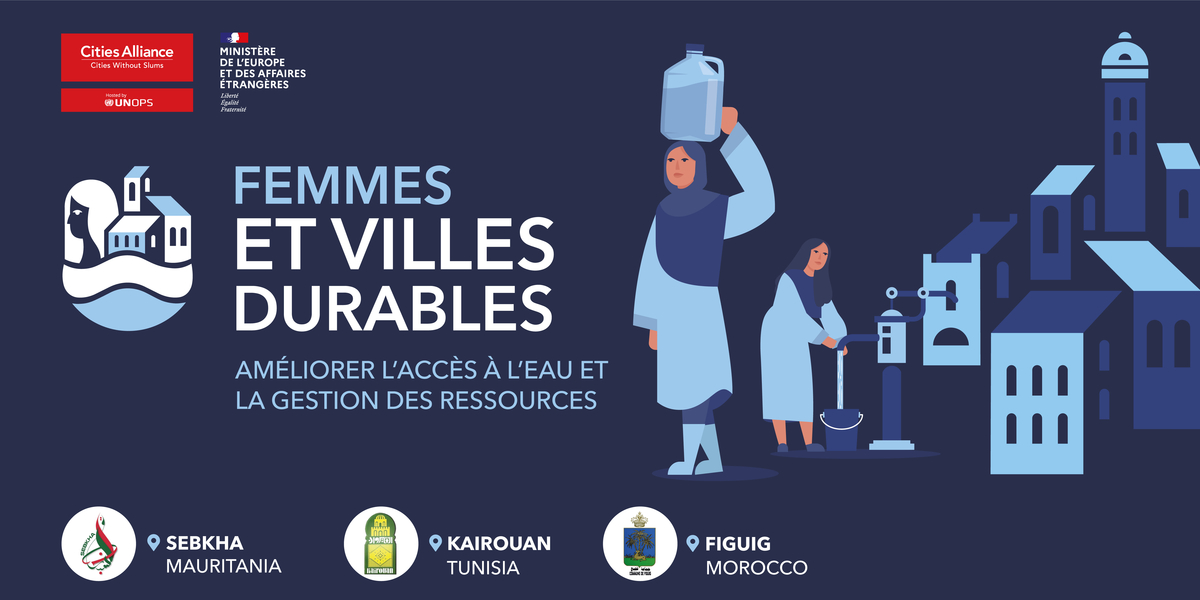
The programme, spanning from 2023 to 2025, will be implemented in Figuig (Morocco), Kairouan (Tunisia), and Sebkha (Mauritania), focusing on three key components:
- Enhance the governance capacities of local authorities for gender-sensitive and sustainable water management: Engage in a participatory approach to collect data on women's and girls' vulnerabilities, challenges, and opportunities related to water access, management, and climate adaptation. This data informs policies and develops a deeper understanding of their current living conditions, empowering local authorities to respond inclusively and sustainably through capacity building. The participatory data collection process is based on Her4Water, a tool developed by Cities Alliance to understand women's participation, engagement and vulnerabilities with respect to water scarcity and other water-related climate risks.
- Support women's empowerment in sustainable water management through capacity building and interventions in public spaces: Facilitate active involvement of women and girls in the programme, enabling them to co-design solutions for identified challenges and implement pilot projects in their cities. Through comprehensive training and capacity-building initiatives, they enhance their knowledge and skills in inclusive urban water management.
- Foster exchange and learning for women-led sustainable water management in targeted cities and countries: Organize a series of exchange events to facilitate knowledge sharing among participating local authorities, civil society organizations, and national/international stakeholders. By disseminating project practices and key findings, the program scales up its impact and contributes to global efforts for creating more inclusive and resilient cities.
The key objectives of the programme include:
- Facilitating the participatory collection of sex-disaggregated data and gender-sensitive indicators on water governance.
- Promoting women's leadership in water governance and management within cities.
- Developing and strengthening the capacities of local and national authorities to design and implement gender-sensitive urban water infrastructures and services.
- Supporting the economic security of women by enhancing their access to water for household use and food production, thereby reducing their workload.
- Stimulating and supporting inclusive multi-level urban governance for water management.
Grantees of the programme:
The Women and Sustainable Cities programme collaborates with local NGOs as grantees in Sebkha, Kairouan and Figuig. The NGOs Lam Echaml (Kairouan), Annahda (Figuig), Serv'Eau (Sebkha) have local knowledge on gender, WASH and participatory approaches and therefore ensure a contextualised project implementation in the cities. They are supporting the project throughout its first phase of data collection, piloting and capacity building for the community.
The close cooperation with the NGO generates capacity building and learning opportunities of project management skills for the present staff in the project cities. A close proximity to the community is ensured through this collaboration with and implementation through local actors, which aligns with Cities Alliance’s principles of localised and contextualised project conception and implementation.
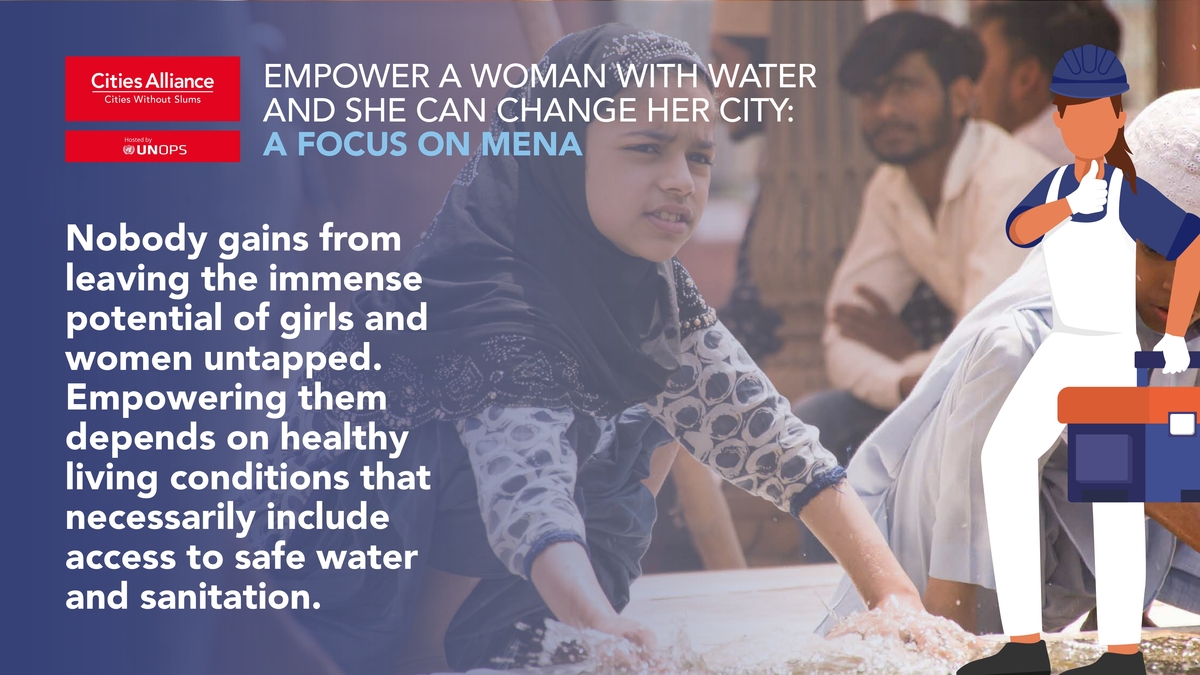
Overview
Kairouan, one of the oldest and most sacred cities in Tunisia, is renowned for its rich water heritage. The city features an ingenious system of cisterns and underground reservoirs, known as the Aghlabid Basins, designed to collect and store rainwater. This sophisticated system, crafted with traditional expertise, allowed Kairouan to thrive in an arid environment, ensuring a sustainable water supply for its inhabitants. Today, the hydraulic systems of Majels (cisterns) stands as a testament to Islamic architectural ingenuity. While Majels are not as common anymore for the citizen's daily water use, they serve as an inspiration for modern water conservation solutions tailored to contemporary climate challenges. Among others, Femmes et Villes Durables seeks to revitalise the Majels as an essential part of rainwater collection on a household and communal level.
In collaboration with national NGO Lam Echaml and the local authority of Kairouan, the project in Kairouan centers around understanding the existence, value and use of Majels in water conservation practices. A large mapping activitiy to evaluate the role of Majels, the participatoin of women in water govrenance and their risks to heat and water scarcity are conducted. Women from the community and municipal staff members participate in training sessions and capacity building. Together with the local authority, one central public space in the city is rehabilitated with a communal Majel to become a more resilient and inclusive public space.
Regional Programme Launch
On Tuesday, September 12, the regional Programme "Femmes et Villes Durables : améliorer l'accès à l'eau et la gestion des ressources" was officially launched on the regional level in a webinar with representatives of the three municipalities, the project donor, as well as local civil society.
After the welcome by Cities Alliance as project implementer, and Cécile Frobert, Vice Director of the Democratic Governance Mission at the MEAE, the Deputy Mayor of Sebkha Diomanci Cissoko, Deputy President of Figuig, Jilal Sounni, and Head of Public Utilities of Kairouan, Hammadi Abdellah, shared insights into the challenges faced by the municipalities in combating climate change and water scarcity, and the pressing need to empower women and increase their participation in decision-making processes concerning water governance.
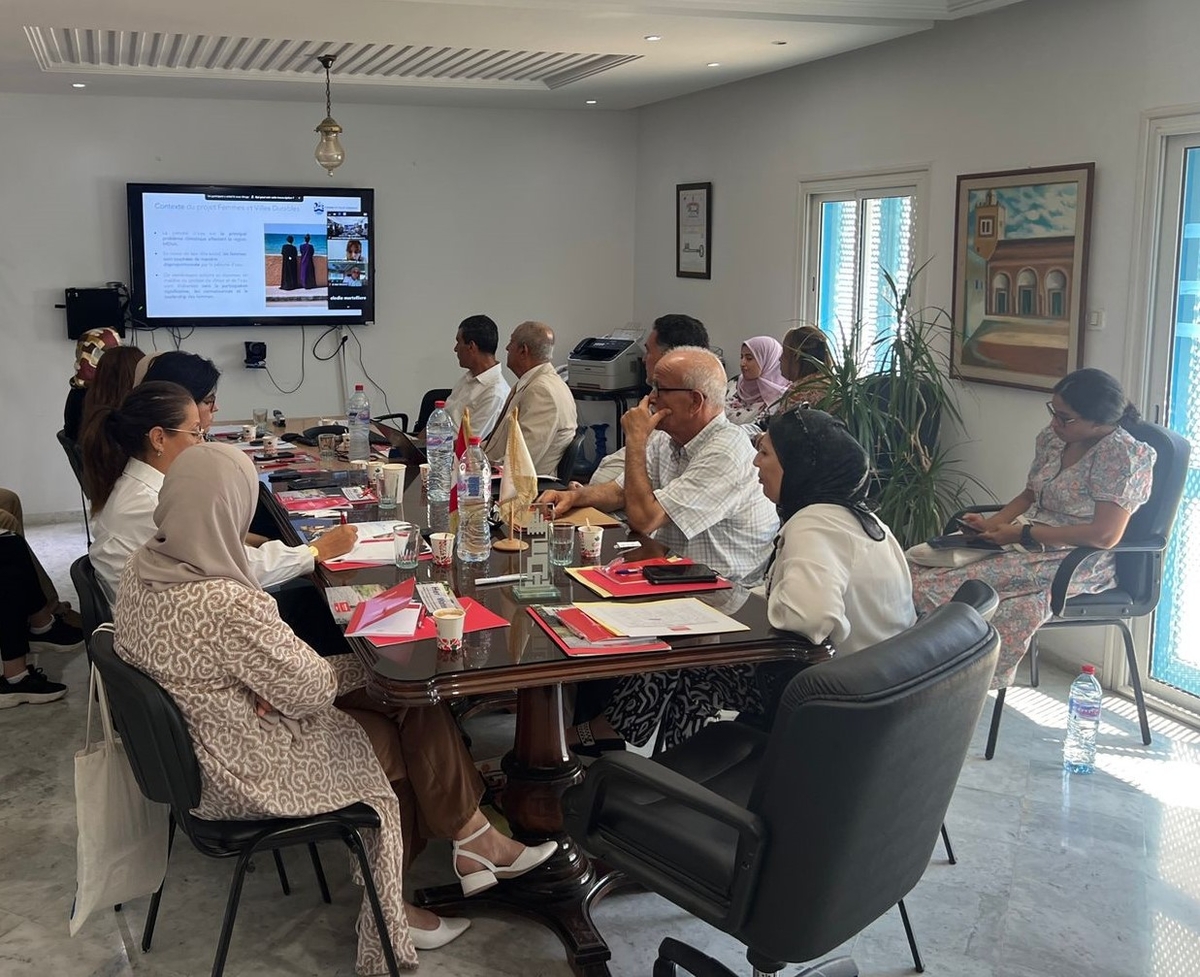
Expert voices of the fields of traditional water conservation techniques (Kairouan), regional initiatives to address climate change (Sebkha), and water governance in oases towns (Morocco) complemented the exchange.
The high participation in the webinar showed the commitment and ownership of the project by the communities. It was an excellent start for the project and for discussions on more sustainable and inclusive water resource management and increasing drought in the three cities.
Key Stakeholder Workshop in Kairouan
Following the successful project launch, key representatives of the municipality, the governorate, local civil society, water authorities, and research institutions came together in Kairouan on September 19 to discuss challenges and opportunities in governing local water scarcity.
Discussed topics were among others, the role of women in current municipal and regional sustainable water governance, the value that traditional water conservation techniques can play in adapting to climate change, as well as the importance of accessible water facilities and green public space for the Kairouan's citizens, and most importantly women and their families. Read a detailed summary here.
Stakeholder advancing governance: Project outputs
Read here the key findings of the workshops in the three cities with key actors, including local authorities, national ministries, civil society, utility providers, elected local representatives, and find out more about the challenges and opportunities how to foster gender-responsive urban water governance in Sebkha, Figuig and Kairouan.
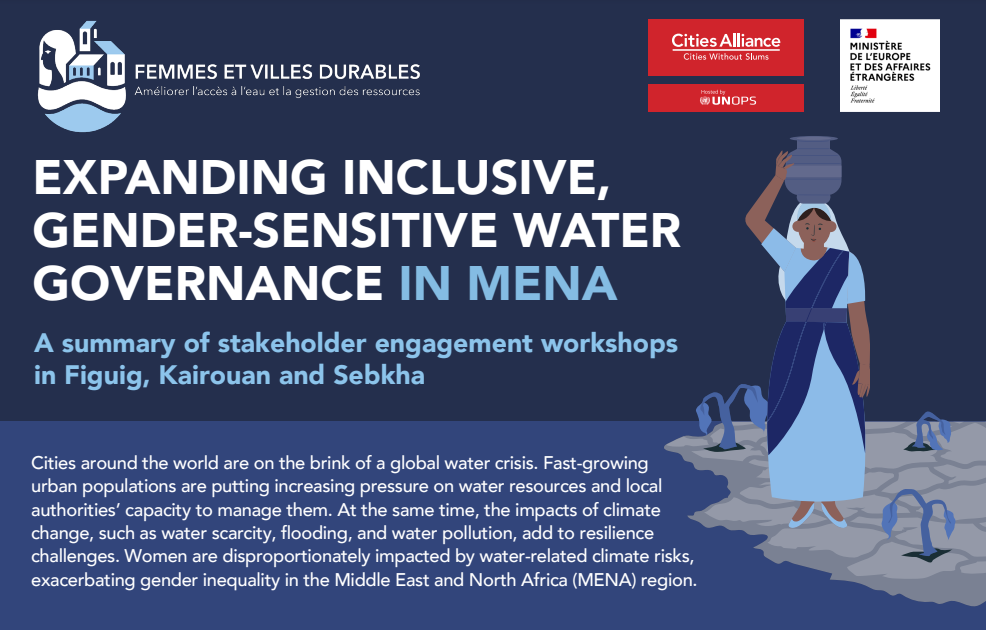
Participatory analysis : Kairouan’s citizens share their experiences on water scarcity and urban water governance
In collaboration with the Tunisian NGO Lam Echaml, 300 citizens - 180 of which were women - were mobilized throughout October 2023 to January 2024. Through citizen surveys, women workshops and semi-structured interviews they delivered key information and contributed to assessing women's vulnerability to water scarcity and their involvement in water governance.
The Her4Water methodology guided the survey questionnaire, aiming to gain a profound understanding of women's engagement in the water sector. Nine members of the community were trained in quantitative and qualitative data analysis, which allowed the large-scale data collection.
Key findings of the analysis include:
- Diverse water sources: Due to frequent power outages and inconsistent water flow and quality from SONEDE taps, residents rely on alternative water supply sources.
- Public water access: Assessment participants stated a scarcity of well-maintained public water fountains and accessible green spaces.
- Participation of women: Women primarily bear the brunt of managing water shortages at home, yet their involvement in communal and associative bodies remains limited.
- Awareness of climate impacts: Women show a fairly moderate knowledge and awareness of the risks that come with climate change and the impact on water resources. They highlight the desire to be better equipped with adaptation mechanisms, and informed about municipal policies and initiatives to face water scarcity in the city.
- Heritage-based solutions: In response to water scarcity, methods like reactivating public taps and installing majels (traditional rainwater cisterns) on the household and public level have proven invaluable, especially during summer. However, a significant knowledge gap among owners regarding the maintenance of private majels was identified.
- Regulatory gaps: Current regulatory frameworks in the water sector fail to specifically address gender issues and are generally rather broad.
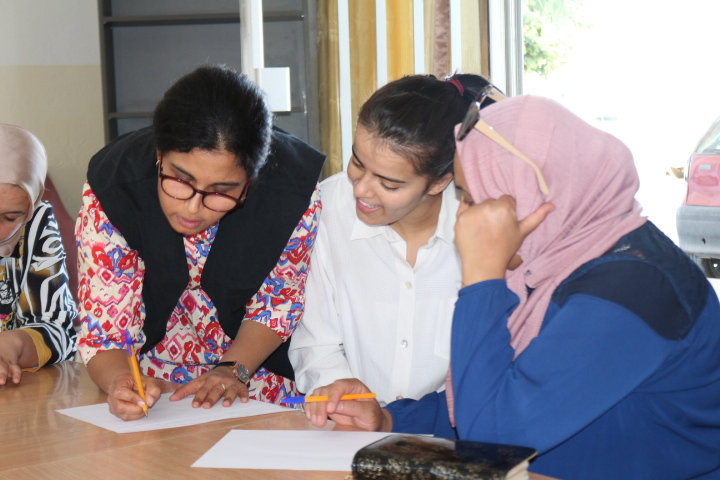
Youth engagement in Kairouan
As the climate crisis intensifies, solutions must address climate risks holistically, empowering communities to be active participants in decision-making processes. Meaningful progress will require decisive and collective action and sustained commitment from all stakeholders. To that end, in the first half of 2024, Cities Alliance conducted a series of creative and engaging activities with the local children and teenagers in the project cities.
In Kairouan, an awareness-raising day was organised with local schools in Spring 2024. Through ludic activities, songs and live performances, pupils learnt about the water cycle, the crucial importance of water conservation and the preservation of natural resources. Following this day, the children shared their experiences with their friends and families, determined to spread the message to them.
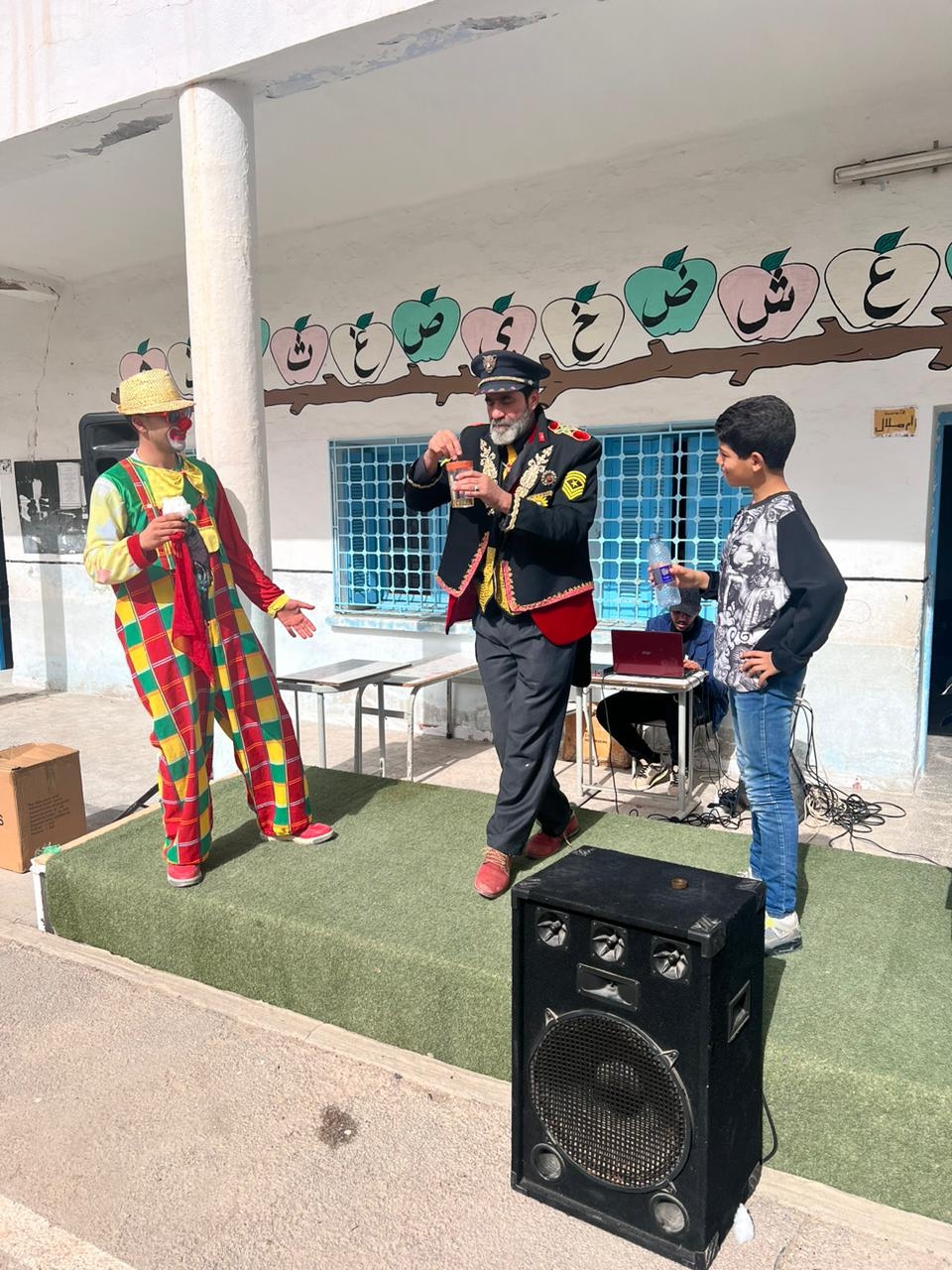
Read more here.
Women and girls improving their knowledge on just water governance initiatives and sustainable water management
During various sessions in May and June 2024, 30 women and girls in Kairouan participated in training sessions to be better equipped and prepared for the ongoing water crises, and increase their knowledge on different national and international sustainable and just water governance approaches.
Together with water governance experts from the field, the participants discussed topics such as the water crisis and its repercussions on the lives and safety of citizens,(inter)national movements of civil protest for the right to drinking water, or international legislations and agreements for sustainable water governance.
Moreover, they learned about the role of women in saving and rationalising water, good practices they can adopt themselves to use water in a more sustainable way, or the potential of grey water reuse and treatment techniques in households.
Majels - untapped potential as additional water source in Kairouan
In Kairouan, historically, large retention basins were built around the medina to ensure supply and storage for the dry seasons, and public spaces and homes were equipped with rainwater harvesting cisterns - Feskias for the former, Majels for the latter.
As part of the participatory assessment phase of women’s risks in times of water scarcity, an analysis of the existence of Majels in Kairouan was undertaken. A survey across 220 households showed that:
- Only about 20 % of the households are equipped with Majels, even though many of the houses surveyed bear the potential for it.
- Only ⅔ of the existing Majels are functioning and used as an additional water supply source, especially during the dry summer months.
- Most women of Kairouan proclaim the wish to possess Majels and integrate in their daily water-use habits and activities, i.e. gardening, cleaning, laundry.
The analysis shows that Majels bear a great untapped potential as rainwater storage and as a supplementary water source during heat waves and water cuts. Increased awareness and spread of Majels across Kairouan is needed and desired.
As a result of this analysis, Cities Alliance is implementing a training program with selected women to improve their skills in Majel maintenance, adequate water storage and hygiene of Majels, as well as improved access to existing funds to promote the implementation of private Majels in their houses.
Rehabilitating the public garden Jardin Municipal, adopting a water and gender lens
Many public spaces in Kairouan remain inaccessible to women and families because of their inadequacy for women's needs. There is often a lack of meeting places, adequate lighting, play activities for children and, especially in summer, shade and greenery to make a stay in public gardens a more pleasant experience.
To respond to these needs, Cities Alliance will, in collaboration with the municipality of Kairouan, rehabilitate the Jardin Municipal garden. A rainwater cistern, hence a public Majel, will be installed to promote sustainable irrigation of the space, plant species adapted to the local climate are foreseen, and various amenities will promote the usage of the space by women and their families, such as shaded picknick tables, adequate lighting, playground facilities, a public stage allowing for neighbourhood festivals and other activities. The rehabilitation will account for the perspectives and experiences of women shared in various co-creation sessions in January 2024.
The Jardin Municipal will also serve as a venue for environmental education, with information panels and possibility for workshops that raise awareness for climate impacts, sustainable water use and other societal matters.
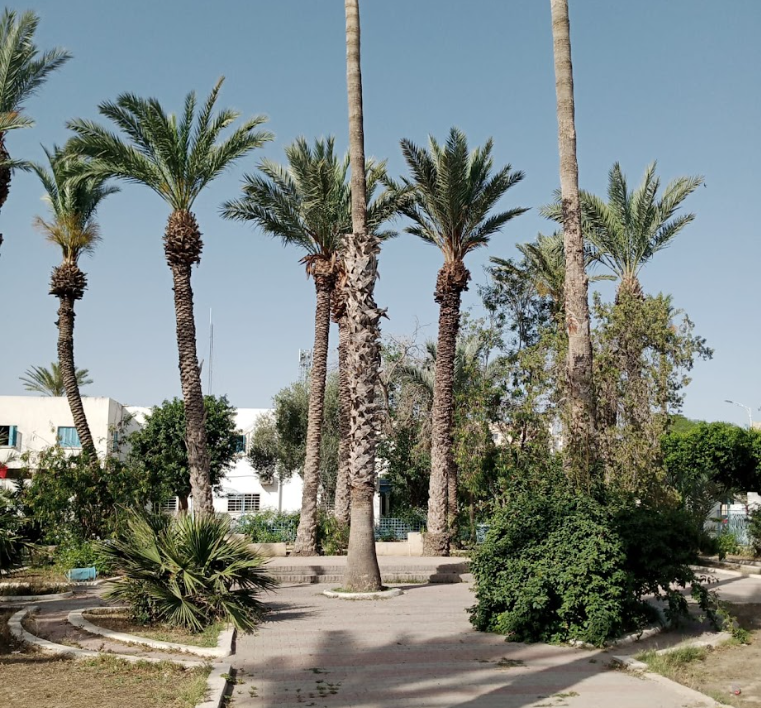
Overview
Sebkha, a commune in Nouakchott with around 120,000 residents, faces significant challenges in its water supply system due to demographic pressures, migration, socio-economic difficulties, and climate change impacts like droughts and heavy rainfall. The inadequate public distribution network, which suffers from insufficient production, low efficiency, and poor water pressure, forces 80% of the population to rely on standpipes and carters for water. Women, particularly single mothers, bear the burden of managing household water needs, despite being excluded from governance decisions. Sebkha's situation underscores the broader issue of water insecurity in urban Mauritania, where inadequate infrastructure, socio-economic factors, and climate change converge, disproportionately affecting vulnerable groups like women and children.
In collaboration with the municipality of Sebkha and the local NGO Serv’Eau, Cities Alliance seeks to promote the role of women in local water governance, increase their economic opportunities in the sector, and facilitate their access to water, particularly during times of drought as well as heavy rain seasons.
Regional Programme Launch
On Tuesday, September 12, the regional Programme "Femmes et Villes Durables : améliorer l'accès à l'eau et la gestion des ressources" was officially launched on the regional level in a webinar with representatives of the three municipalities, the project donor, as well as local civil society.
After the welcome by Cities Alliance as project implementer, and Cécile Frobert, Vice Director of the Democratic Governance Mission at the MEAE, the Deputy Mayor of Sebkha Diomanci Cissoko, Deputy President of Figuig, Jilal Sounni, and Head of Public Utilities of Kairouan, Hammadi Abdellah, shared insights into the challenges faced by the municipalities in combating climate change and water scarcity, and the pressing need to empower women and increase their participation in decision-making processes concerning water governance.
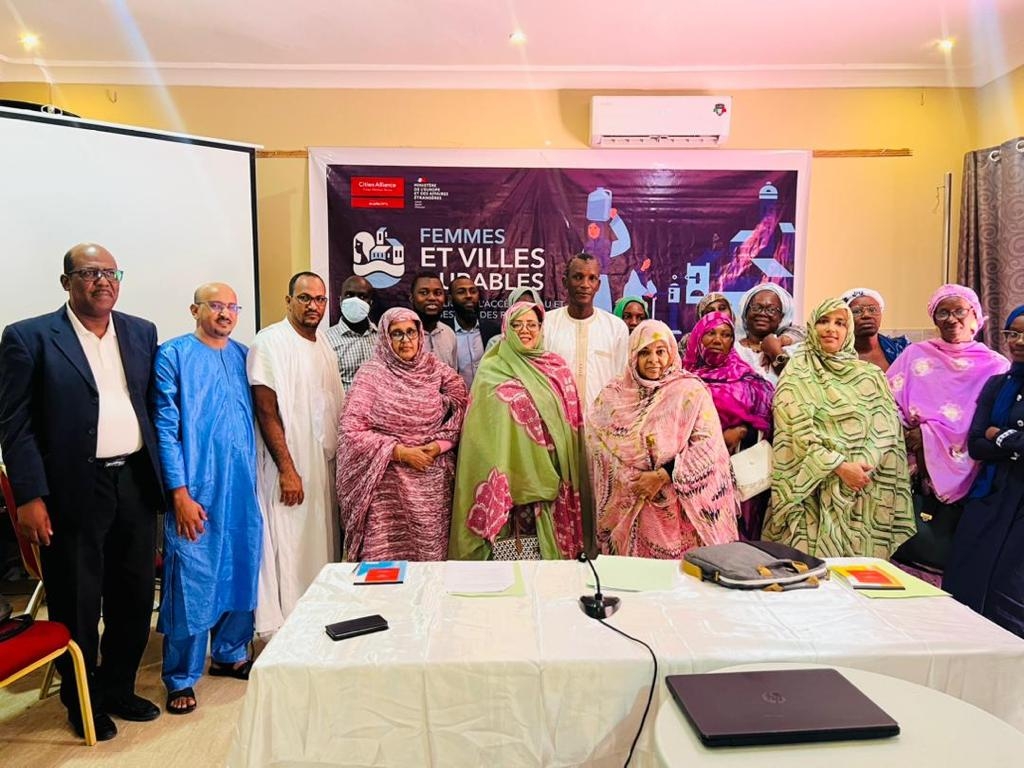
Expert voices of the fields of traditional water conservation techniques (Kairouan), regional initiatives to address climate change (Sebkha), and water governance in oases towns (Morocco) complemented the exchange.
The high participation in the webinar showed the commitment and ownership of the project by the communities. It was an excellent start for the project and for discussions on more sustainable and inclusive water resource management and increasing drought in the three cities.
Participatory stakeholder engagement workshop in Sebkha
On October 19, representatives of the municipality of Sebkha, local women-led civil society organisations, regional authorities, and water authorities and institutes discussed the challenges of inclusive water access and climate adaptation measures in Sebkha. Participant's engaged in focus groups on various themes, including the impact of climate change on women's access to water, challenges and opportunities of gender-sensitive and inclusive water governance, and the sensibilisation for more sustainable water use in Sebkha.
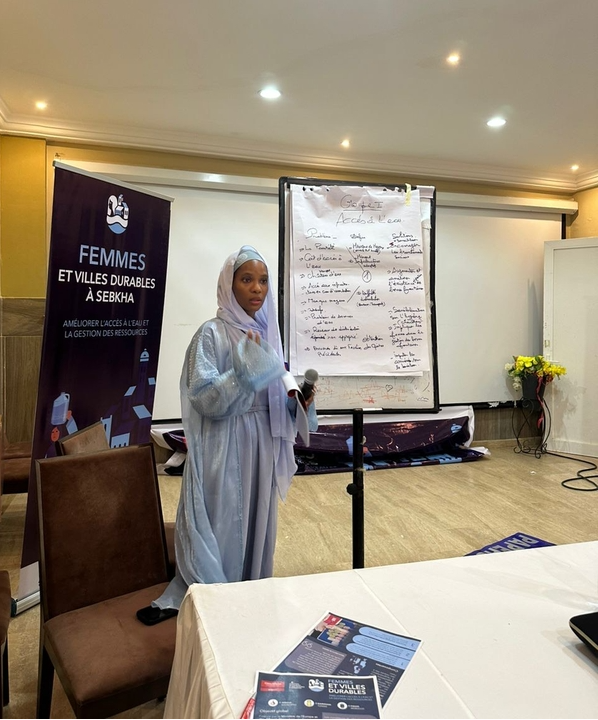
Read the summary of the stakeholder workshop in the three cities here.
Sebkha’s citizens participate in engagement sessions to assess water vulnerability and governance participation of women
Between November 2023 and January 2024, more than 480 citizens participated in various activities, including citizen surveys, women workshops, semi-structured interviews, and community mapping, to assess the risk and challenges of women in terms of access to water and climate change impacts.
This resulted in the emergence of some key challenges that women face in the community, including the need to promote women's participation in local water governance, facilitating their access to water and promoting economic opportunities in the water sector.
The analysis revealed that out of the 11 existing water points in Sebkha, only one is managed by a woman. Moreover, insufficient hygienic conditions around the water points impede the water collection process, exacerbated also during the rainy season when water points are flooded. Bloated prices for water sold at water points and the water carters further complicate the situation, making it even more difficult for residents, particularly those from low-income households, to access affordable and safe water, thereby deepening the community's vulnerability to water scarcity and related health risks.
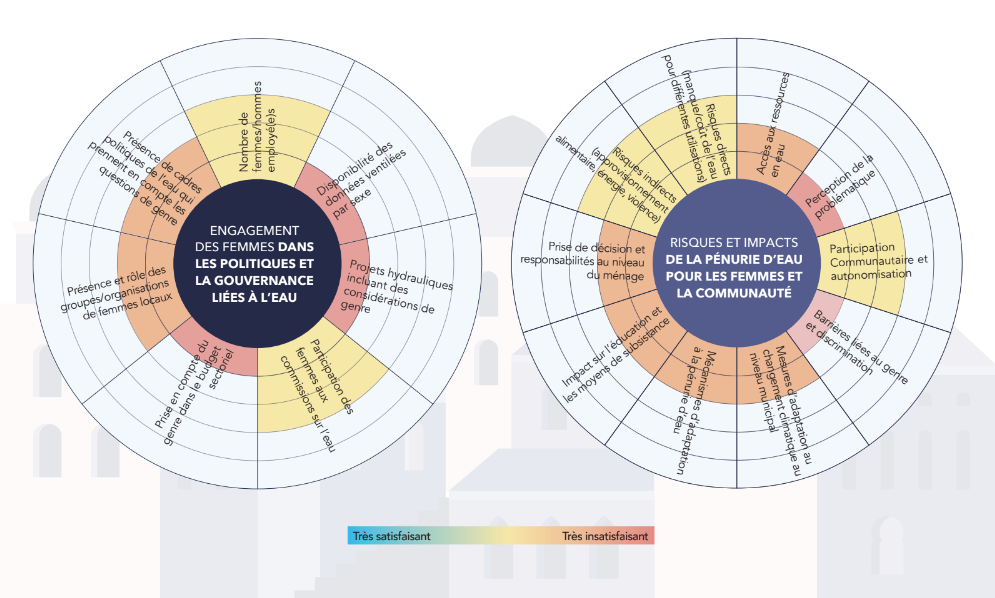
As a result of the analysis, Cities Alliance and the municipality of Sebkha collaborate to create the first collective water point that is co-governed by the women and the municipality of Sebkha.
Sebkha’s municipal staff increase competences for inclusive urban planning and environmental governance
Femmes et Villes Durables seeks to promote the capacities and competencies of the municipality for inclusive urban planning and water governance. To this end, in collaboration with local NGO Serv’Eau, we organised a workshop for municipal staff and council member which facilitated an institutional self-assessment and identified key areas for staff capacity building in gender-sensitive urban management.
This was followed by three targeted training sessions in May covering topics such as improving urban infrastructure, environmental protection, and community involvement, with a focus on gender considerations. Supported by Cities Alliance, SERV'EAU ensured that 31 municipal staff members, including 15 women, received training relevant to their roles within the municipality.
As a member of the local development section, this training increased my awareness of the importance of considering the voice of women when it comes to governing the environment and water projects in Sebkha.
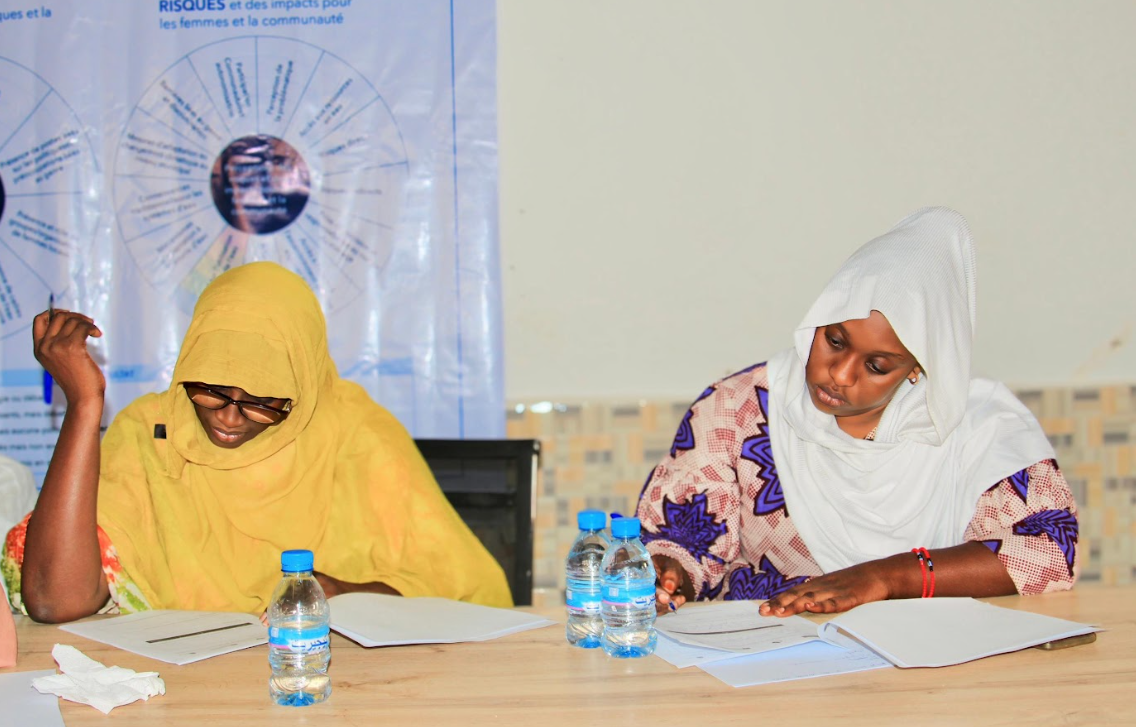
Women from the community participate in training on water treatment techniques and hygiene regulations
In Sebkha, women play a crucial role in storing drinking water, typically using plastic containers. Despite employing some water purification techniques, many lack comprehensive knowledge about proper storage practices and disease prevention. To address this gap, 30 women participated in training sessions designed to enhance their skills in water storage, treatment, and hygiene. Many of these participants are key community leaders who, equipped with this new knowledge, are well-positioned to disseminate best practices within their communities. The training aims to leverage their leadership to foster improved water management and hygiene, thereby enhancing water safety and public health across Sebkha.
Art activity with Sebkha’s youth to raise awareness for climate risks
In an effort to engage the youth of Sebkha in the fight against climate change, school children took part in educational sessions and community projects aimed at promoting environmental awareness.
Together with a local artist from Nouakchott, pupils of one public school in Sebkha worked on a project to raise awareness within their community, painting a mural on the City Hall depicting the impacts that water scarcity has on their lives and highlighting the importance of equal access to water. The children’s eager participation reflects the growing awareness of the younger generation about the need and importance of sustainable practices when they already experience the dramatic effects of climate change daily.
I draw a tap without water because there is no running water here.
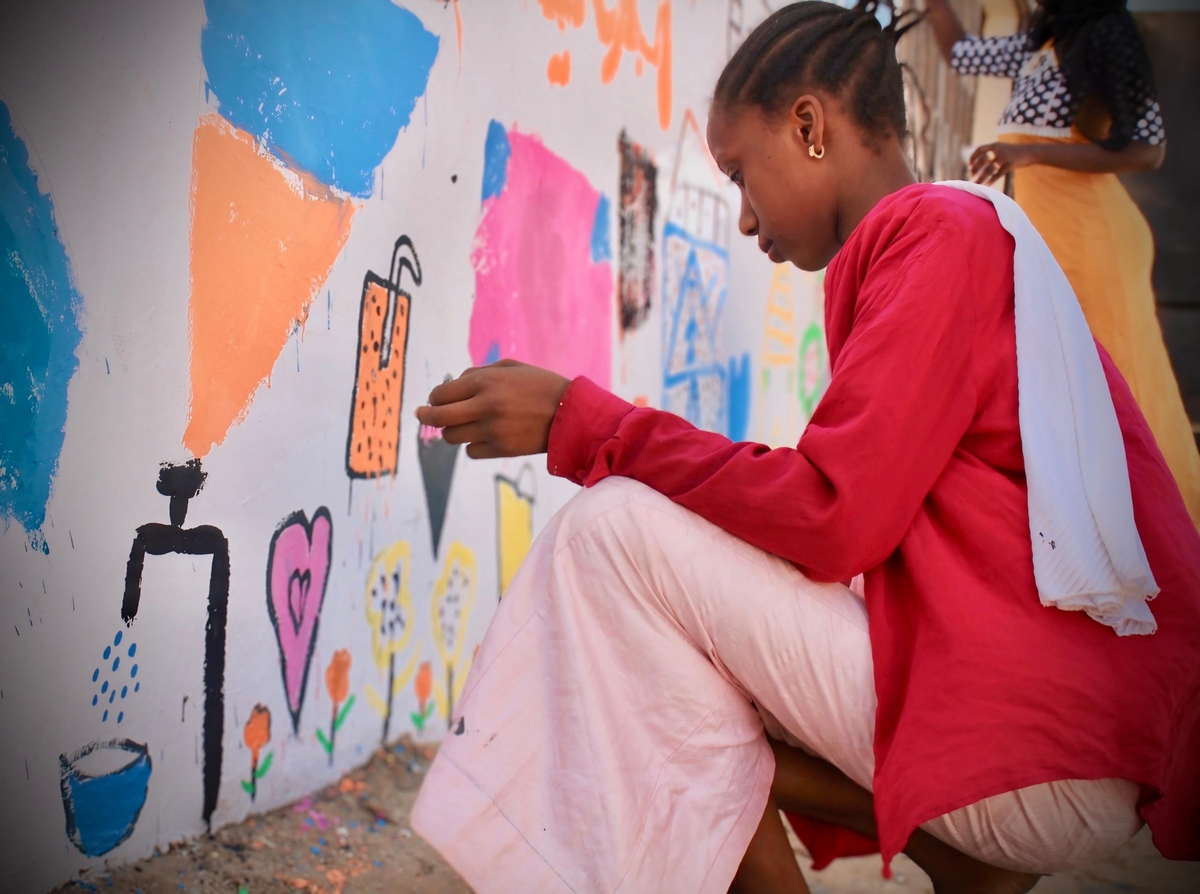
Read more here.
Creation of the first collective water point, co-governed by women from the community
Cities Alliance and the municipality of Sebkha are co-creating and implementing the first collective water point in Sebkha. Located in the neighbourhood of Lkouve, where more than 70 % of the population depend on water points and water carters, the envisioned water point will contribute to serving around 4,200 citizens with access to safe drinking water.
In various co-creation sessions with the citizens, their concerns, demands and ideas of the population were collected and discussed to design a water point that responds to their needs. As a result, the first communal water point in Sebkha that is not managed by private individuals, will feature a new-generation water fountain with mixed management involving both the Sebkha municipality and local women, ensuring community engagement and oversight. It will empower women as key players in local water governance, enhancing their role in decision-making and management, providing them also an additional income source.
The fountain will provide a safe, accessible space that meets the needs of women and their families, offering a communal meeting point as well as a space for economic activities. Additionally, it will account for hygiene needs and include training on water quality and its health impacts to further support community well-being.
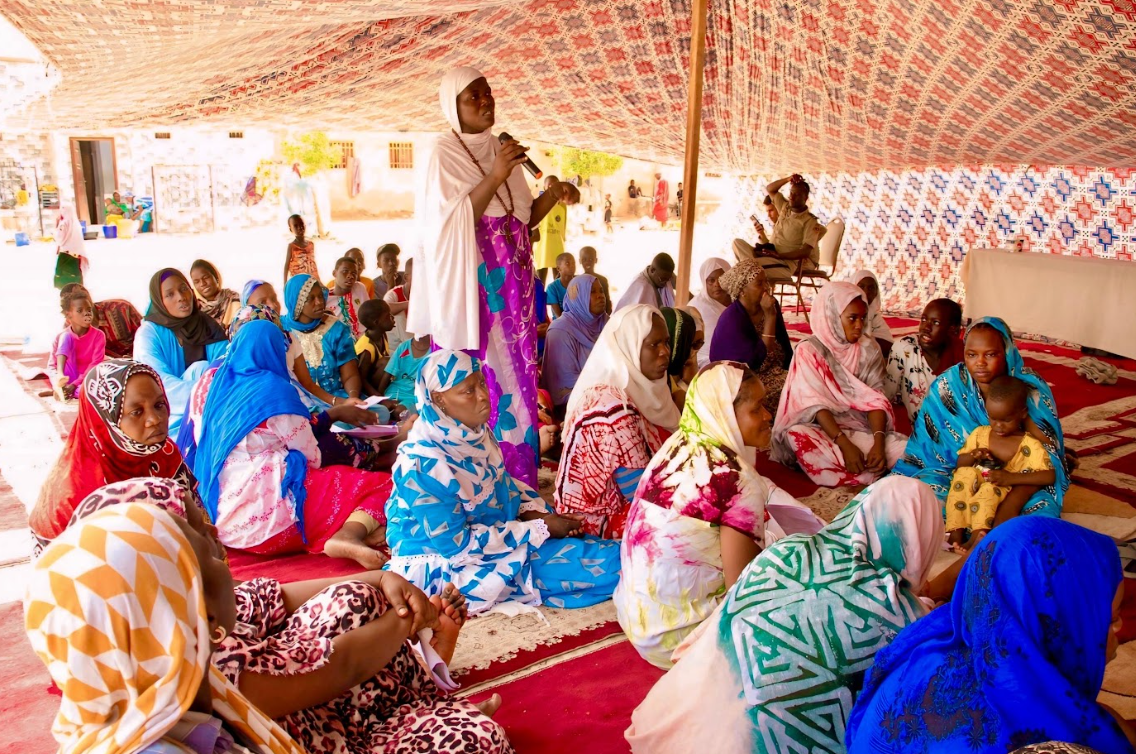
Watch the video to learn more.
Figuig is a unique cultural and historical treasure, deeply rooted in a centuries-old tradition of water management. Its distinct oasis landscape and rich heritage are invaluable assets that must be preserved amidst modern challenges. However, the oasis is under significant threat from escalating water scarcity and the growing effects of climate change, which endanger both its ecological balance and the well-being of the local community. Despite being vital to traditional water management practices, women in Figuig are frequently sidelined from decision-making and community initiatives, undermining sustainable resource use and diminishing the community's resilience to climate change.
Regional Programme Launch
On Tuesday, September 12, the regional Programme "Femmes et Villes Durables : améliorer l'accès à l'eau et la gestion des ressources" was officially launched on the regional level in a webinar with representatives of the three municipalities, the project donor, as well as local civil society.
After the welcome by Cities Alliance as project implementer, and Cécile Frobert, Vice Director of the Democratic Governance Mission at the MEAE, the Deputy Mayor of Sebkha Diomanci Cissoko, Deputy President of Figuig, Jilal Sounni, and Head of Public Utilities of Kairouan, Hammadi Abdellah, shared insights into the challenges faced by the municipalities in combating climate change and water scarcity, and the pressing need to empower women and increase their participation in decision-making processes concerning water governance.
Expert voices of the fields of traditional water conservation techniques (Kairouan), regional initiatives to address climate change (Sebkha), and water governance in oases towns (Morocco) complemented the exchange.
The high participation in the webinar showed the commitment and ownership of the project by the communities. It was an excellent start for the project and for discussions on more sustainable and inclusive water resource management and increasing drought in the three cities.
Stakeholder collaboration session in Figuig
Representatives of the commune of Figuig, the local civil society, the national utility office, and the local water councils came together in an interactive session to discuss challenges and recommendations for more inclusive, gender-sensitive and resilient water governance and management in the oasis town Figuig. Discussions on the lacking participation of women in water councils and decision-making, issues of polluted drinking water, lacking sanitation facilities, and non-maintained wash houses, a key element in women's daily lives, shaped the day.
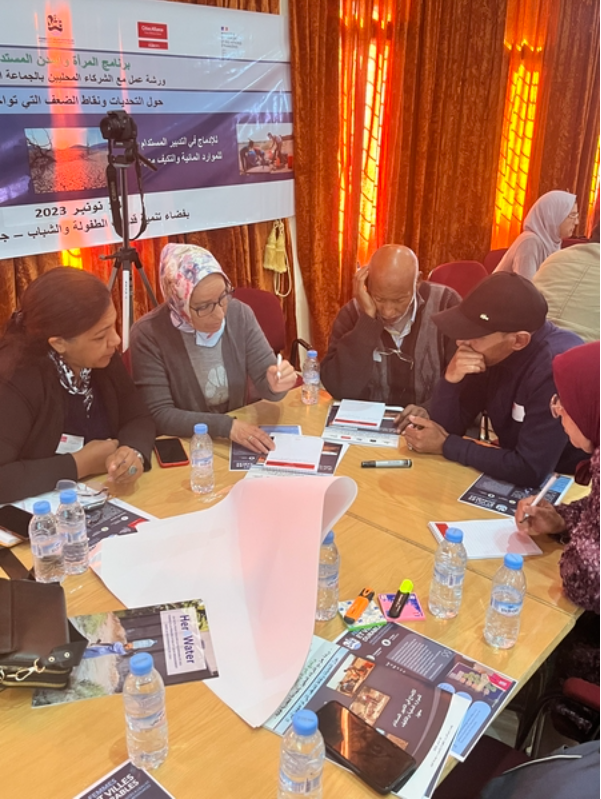
Read the summary of the stakeholder workshop in the three cities here.
Figuig’s citizens participate in assessment of their water and climate vulnerabilities and governance opportunities
In collaboration with the local consortium of the NGO Annahda and the Women’s Forum for Sustainable Development of Figuig (Forum des Femmes pour le Développement Durable de Figuig), more than 230 citizens, mostly women, were engaged in various participatory activities allowing the analysis of their role in water governance and their risks to climate impacts.
Through women workshops, community mapping and citizen surveys, they shared their experiences and perspectives, resulting in various findings:
- Under-representation of women in water management bodies and political decision-making: Figuig’s women are completely excluded from the agricultural water governance domain with water bodies (Associations d’Usagers d’Eau d’Agriculture, Conseil Local d’Eau) solely composed of men. Few women are involved in drinking water governance as technical, administrative and financial roles.
- No consideration of gender aspects in local water policies, initiatives and programmes.
- Limited adaptation mechanisms: Due to lack of knowledge and suitable tools, many women are facing issues with adapting to the growing water scarcity.
- Public water (communal springs, water plazas, date palm gardens, ksour washhouses) and sanitation infrastructures are often insufficiently accessible and not designed to meet women's specific needs. Moreover, the traditional public baths and washhouses that serve as points of refreshment and encounter are formally managed by men, complicating women’s access and preventing a greater engagement and ownership of the facilities.
- Drinking water access provided: Despite its remote location and particular urban tissue, households of Figuig are fully connected to the drinking water system. The nomades who reside at the outskirts of the city, however, depend on two public water fountains for their water supply.
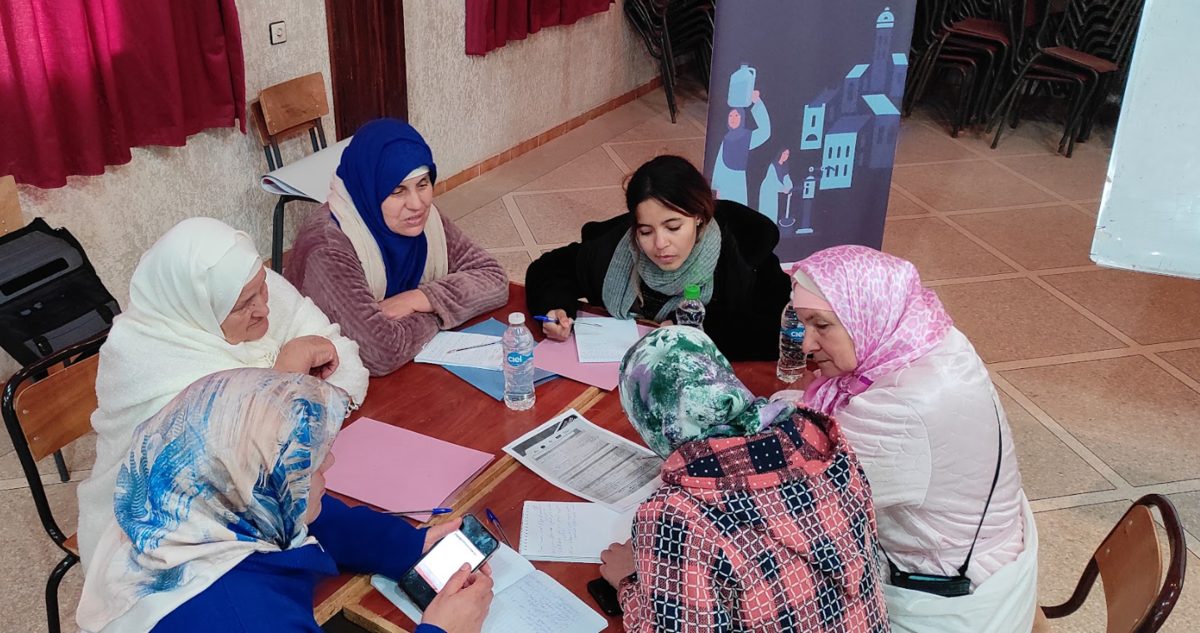
Short film competition to increase awareness for climate impacts among youth in Figuig
As the climate crisis intensifies, solutions must involve communities in decision-making. Progress requires collective action and commitment from all stakeholders. In early 2024, Cities Alliance engaged children and teenagers in project cities through creative activities. While not traditional decision-makers, young people can influence their communities today, starting with their families. It's crucial to involve youth in adopting resource-preserving behaviors and challenging gender stereotypes in resource management.
In Figuig, adolescents participated in May 2024 in a short film competition focusing on water-related issues. From scarcity to pollution to women's role in water management, the young filmmakers are using their creativity to raise awareness and spark conversations within their communities. The goal was to encourage young people to become actively involved in finding solutions to the water-related challenges of climate change. The award ceremony for the winning films will take place in autumn 2024.

Read more here.
47 women participate in training sessions to increase their role in local water governance
In Figuig, while women have the right to utilise spring water for irrigation and in wash houses, they are largely excluded from the decision-making processes concerning water management. This exclusion results in a significant gap in their knowledge of water-related issues and limits their ability to develop the skills necessary for effective participation.
To address this disparity, a series of capacity-building activities were conducted in May and June 2024. During these sessions, 47 women from Figuig participated in various training modules designed to empower them with the knowledge and skills needed to become more engaged and influential actors in the governance of climate and water issues in their community.
Topics like Good governance in Sustainable Water Management, Women’s transformative leadership, or the existing normative, legislative and regulatory international and national water frameworks were covered. Simulation games, the creation of an inclusive road-map for sustainable water governance, or the discussion of case studies allowed the participants to reflect, exchange and increase their understanding of governance approaches for sustainable water management.
Particularly important to the workshop participants was the participation of male members of the local water bodies (Association d’Usagers d’Eau Agricole) as usually there are little exchange moments between the organisations and the women. Their participation allowed for knowledge transfer but also sensitised the associations for the importance of integrating women in their structures.
As a woman who owns a farm, water is a crucial issue in my life. I've been involved in a number of initiatives, including the construction of storage basins to preserve water. This training has given me the tools I need to fill the gaps in our knowledge of partnerships and fund-raising for our actions.
As a result of these workshop sessions, Cities Alliance in collaboration with the grantee Annahda, is now implementing a political leadership programme with selected women to increase their participation in the water associations and support them as candidates for the 2025 elections of the local water council.
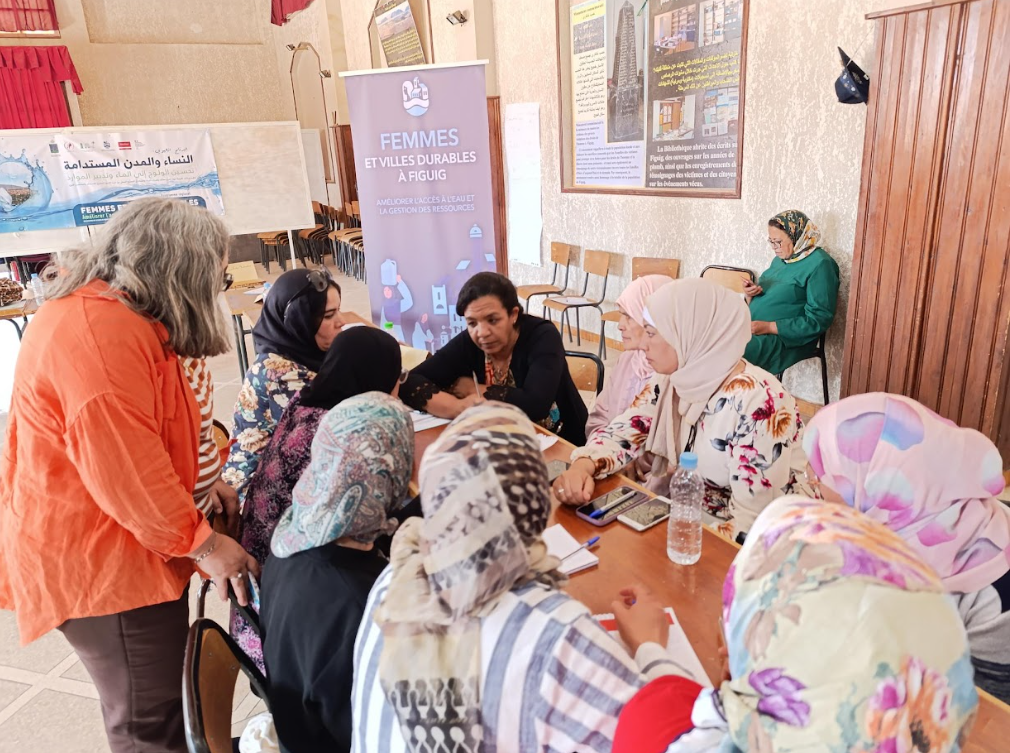
Adaptation of water points to women's needs
The participatory assessment phase with Figuig’s citizens has shown that the increasing frequency of heat waves and water scarcity in Figuig call for the urgent need for green, water-rich spaces where citizens can gather and find respite during these challenging conditions.
Therefore, the proramme Femmes et Villes Durables will collaborate with the municipality of Figuig as well as with the civil society to transform selected public spaces according to the identified needs.
Wash house in Ksar Hamam Foukani
The women-only wash house Hamam Foukani is a daily destination for many women of the neighbourhood to pursue chores such as laundry, daily hygiene or simply refresh themselves. Despite its frequent usage, it is poorly adapted to women’s needs and lacking, for instance, changing facilities, sanitation, or adequate lighting. Cities Alliance will support the community and the water association to rehabilitate the wash house to the women’s needs, ensuring safe and adequate access. Moreover, sensibilisation sessions on water pollution and grey water treatment will contribute to the sustainability of the wash house. As women are currently not involved in the governance and management decisions of the wash house, despite being their only users, a women’s committee will be created to formalize women’s decision-making around the wash house.
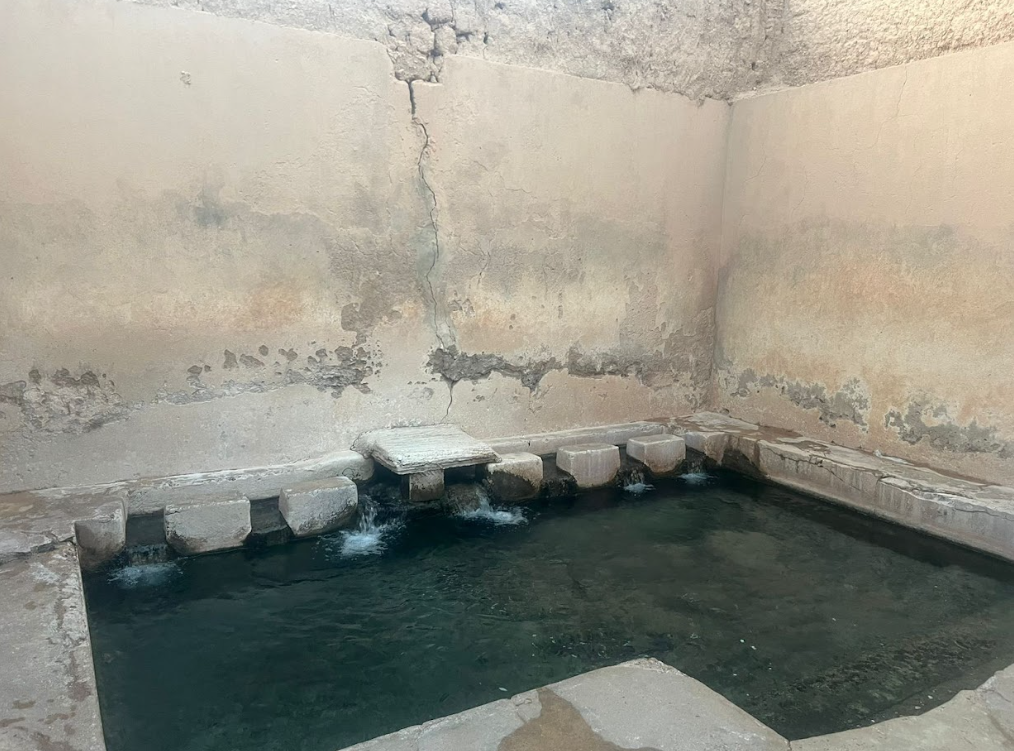
Place Ajadir in Ksar Loudaghir
The public space around the water source Ajdir located right next to the palmery is an important space in the city of Figuig. Especially popular at sunset and in the evenings, it is frequented by girls, women, and their children as a place of refreshment within the palm grove. Known for its artistic ambiance, it serves as an exhibition space for local artistic products. During the date festival, the garden becomes a vibrant location for shows and activities. As part of the project, Cities Alliance supports the municipality to modernize the square's infrastructure to make it more accessible and functional for women by improving safety with better lighting, creating pedestrian paths, adding urban furniture and children's play equipment, while promoting sustainable water use practices from its springs. This promotes Ajdir’s role as a space for women and their children to enhance their daily experiences and strengthen the community by offering meeting places within the oasis.
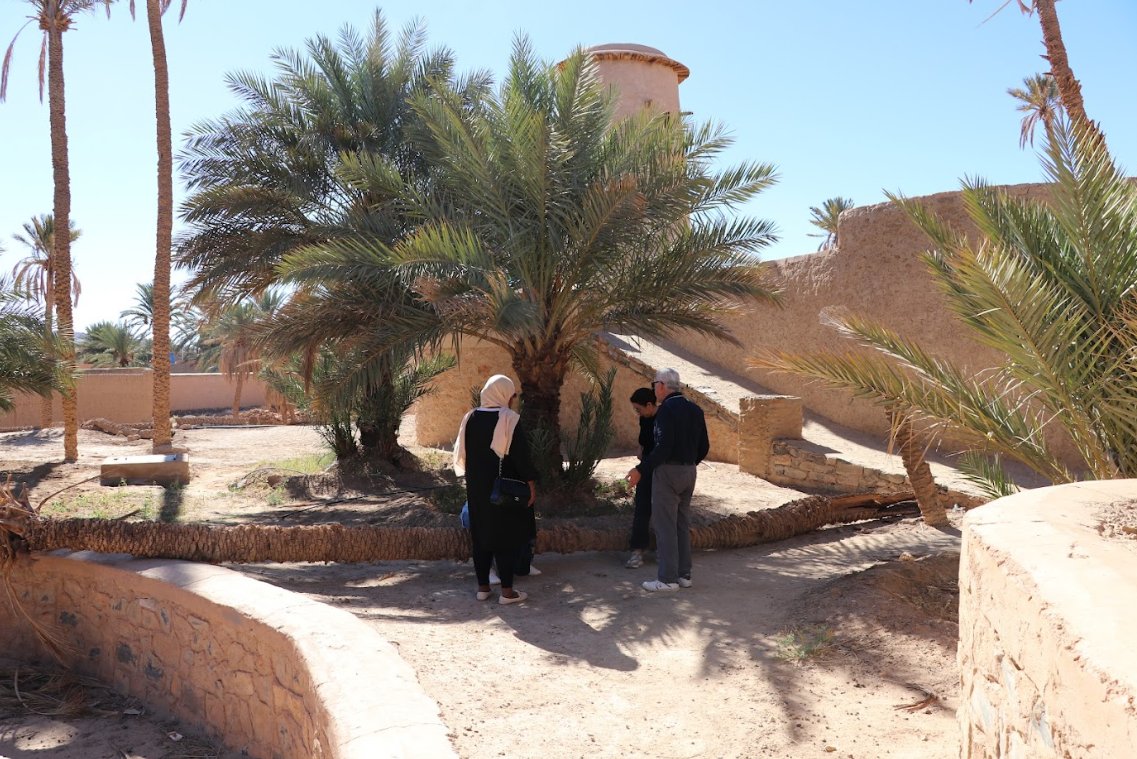
To analyse women's participation in urban water governance and their risks, challenges and opportunities in the water sector, the Her4Water tool was localized to the context of the three cities. As a guiding tool for the diagnostic phase, Her4Water allowed to bolster the comprehension of gender-specific challenges tied to water scarcity in Figuig, Sebkha and Kairouan.
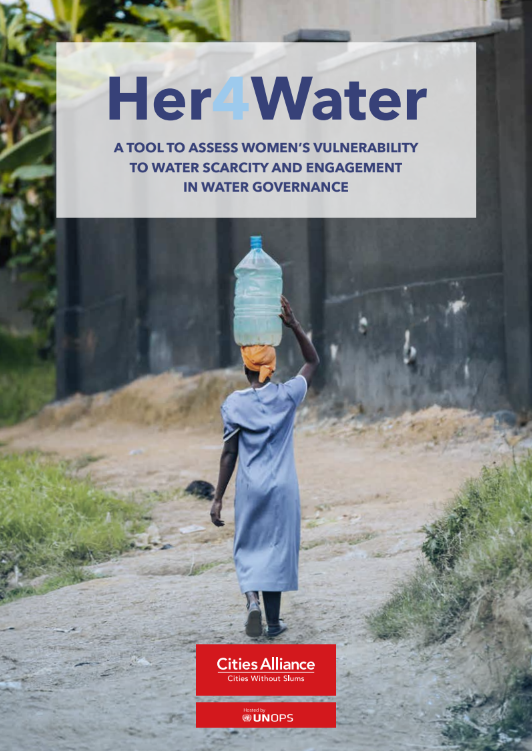
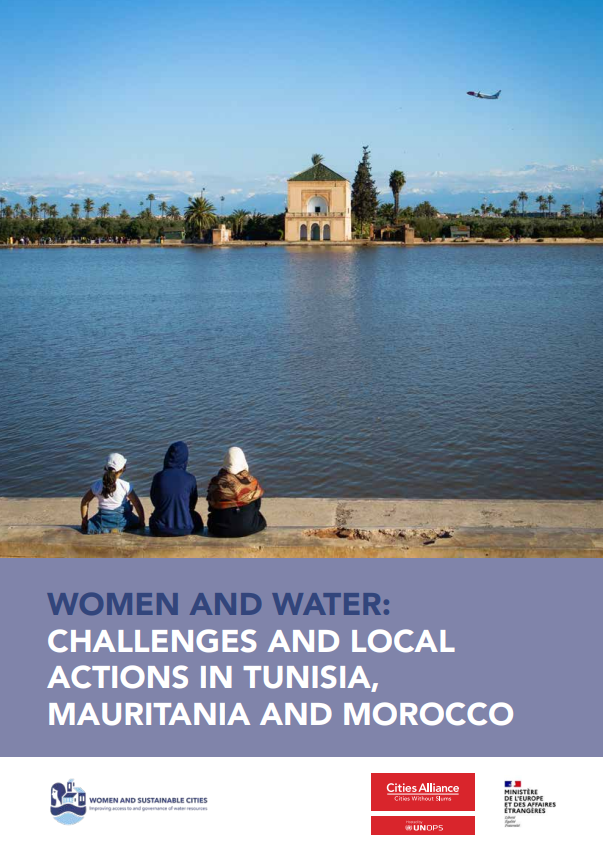
Participatory Assessment Report
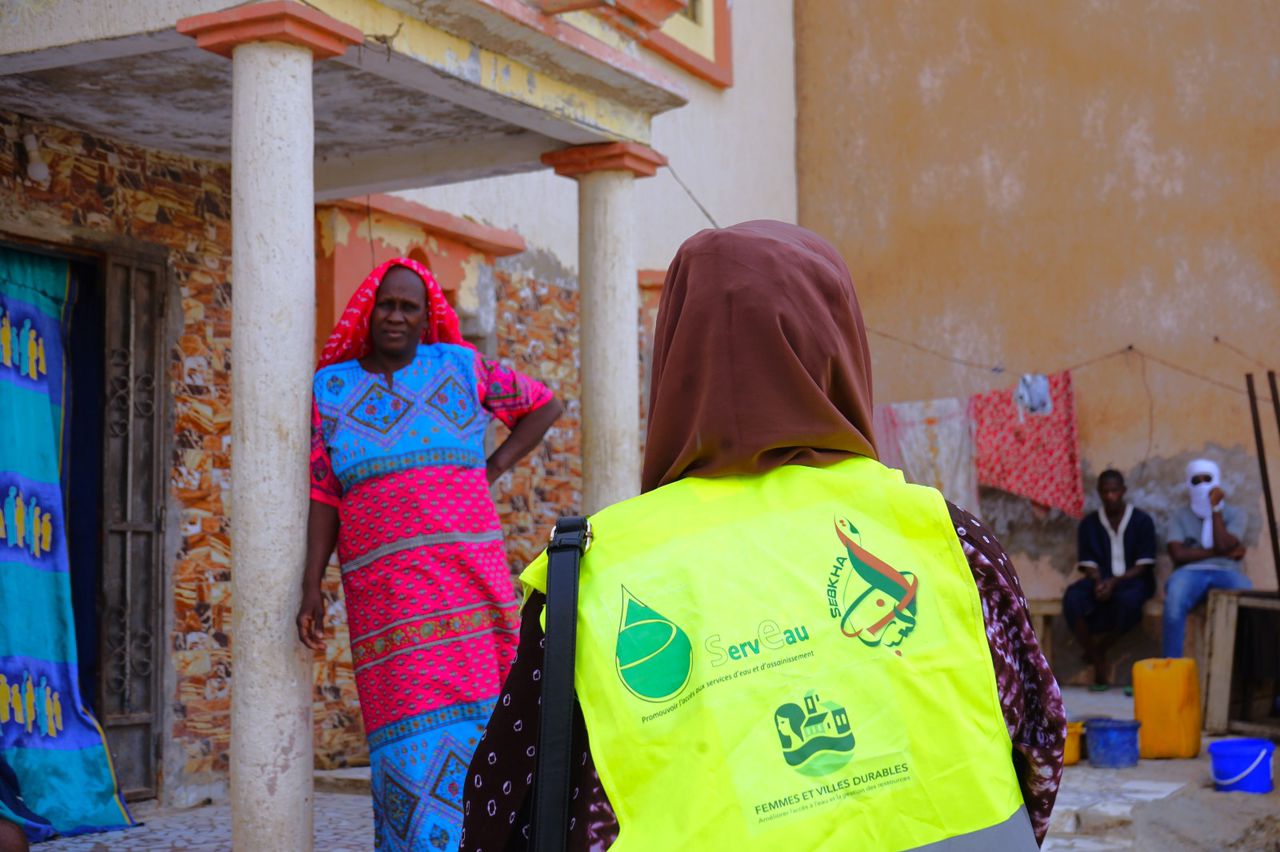
Project Component Sebkha
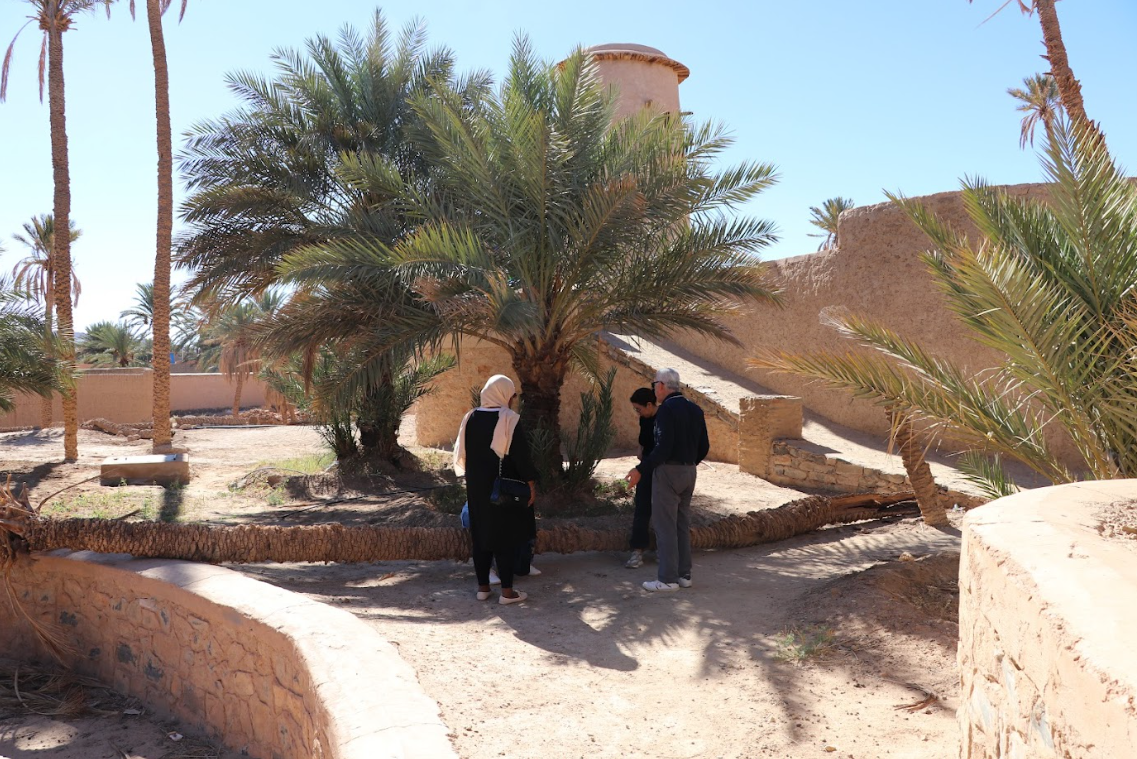
Project Component Figuig
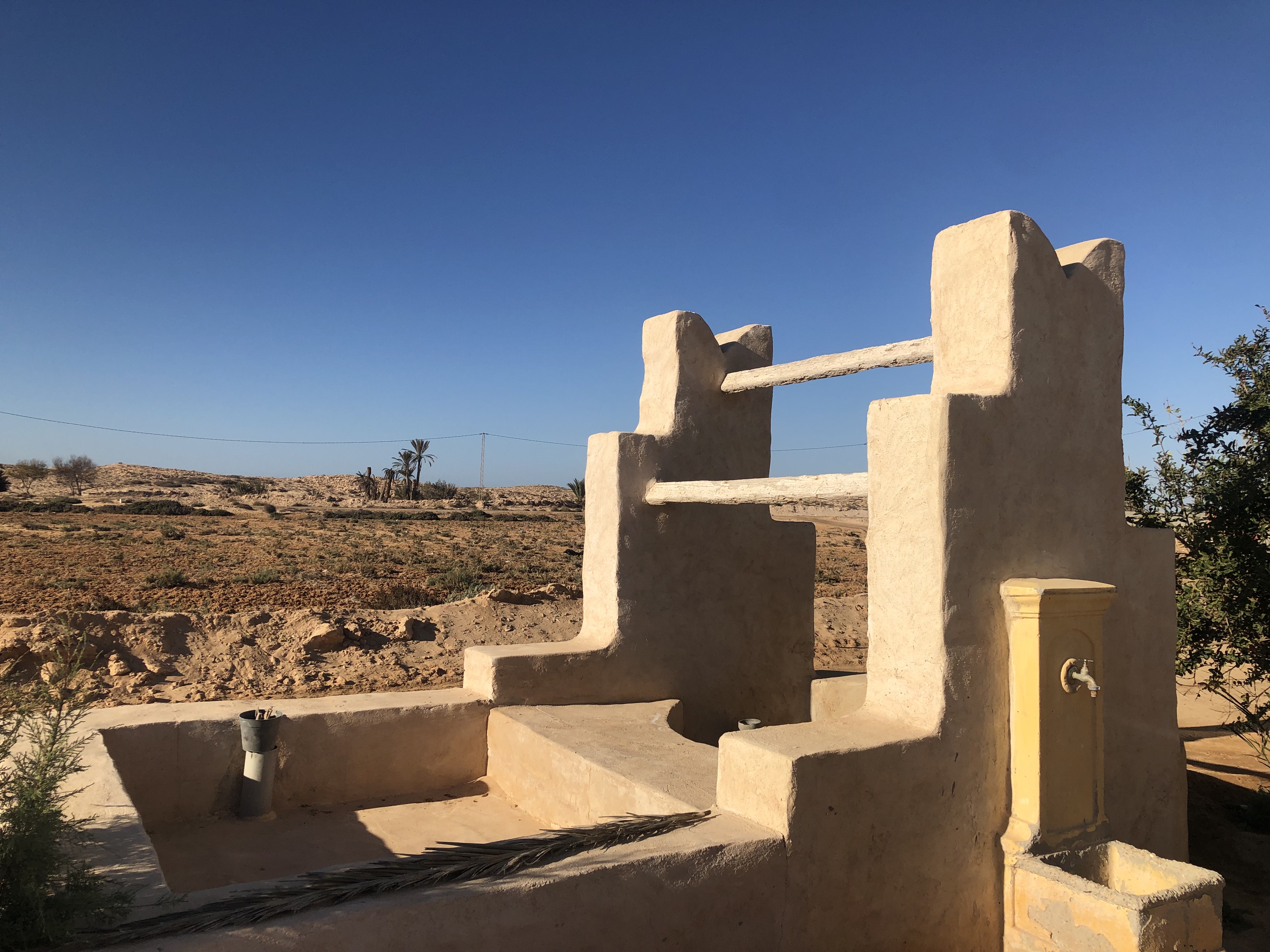
Project Component Kairouan
